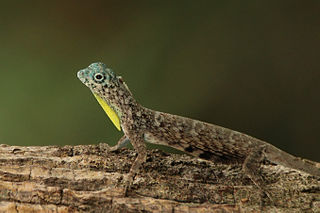
Draco is a genus of agamid lizards that are also known as flying lizards, flying dragons or gliding lizards. These lizards are capable of gliding flight; their ribs and their connecting membrane may be extended to create "wings" (patagia), the hindlimbs are flattened and wing-like in cross-section, and a flap on the neck serves as a horizontal stabilizer and are sometimes used in warning to others. Draco are arboreal insectivores.

Dracaena draco, the Canary Islands dragon tree or drago, is a subtropical tree in the genus Dracaena, native to the Canary Islands, Cape Verde, Madeira, western Morocco, and is thought to be introduced in the Azores. It is the natural symbol of the island of Tenerife, together with the blue chaffinch. Its closest living relative is the dragon's blood tree of Socotra, Dracaena cinnabari.

Draco volans, also commonly known as the common flying dragon, is a species of lizard in the family Agamidae. The species is endemic to Southeast Asia. Like other members of genus Draco, this species has the ability to glide using winglike lateral extensions of skin called patagia.
The blackfin cisco was a North American salmonid fish in the freshwater whitefish sub-family Coregoninae. This silvery, deep-bodied fish with black fins, large eyes, a blunt snout and a terminal mouth, was one of the largest forms of ciscoes. The blackfin cisco used to inhabit the Great Lakes of North America until recently, but has been reported to have gone extinct. The blackfin cisco is a member of the C. artedi complex, whose taxonomy has not yet been resolved, and it may not represent a valid species.

Draco blanfordii, commonly known as Blanford's flying dragon, Blandford’s flying lizard, or Blanford's gliding lizard, is a species of "flying" lizard in the family Agamidae. The species is endemic to Asia, and is capable of gliding from tree to tree.

Draco dussumieri or Indian flying lizard, is a species of agamid lizard capable of gliding from tree to tree. It is found principally in the Western Ghats and some other hill forests of Southern India. They are almost completely arboreal, found on trees in forests and adjoining palm plantations where they climb trees to forage for insects and glide to adjoining trees by expanding the patagium, loose skin on the sides of the body which are supported by elongated ribs to act as wings. The skin on the sides of the neck are also extended to the sides using the hyoid bones of the tongue to support them. During the breeding season males maintain small territories which they defend from other males while courting females. Males have a more colourful patagium than females and they prominently extend their yellow dewlaps forward in display. Although living almost their entire lives on the trees, females descend to the ground to lay eggs in soil. This is the species with the westernmost distribution within the genus Draco, the majority of species occurring in Southeast Asia.
The reticulated toad-headed agama is a species of agamid lizard found in Central Asia and West Asia.
The South China field mouse is a species of rodent in the family Muridae. It is found in China, India, and Myanmar.

The Taiwan field mouse, also called Formosan wood mouse, is a species of rodent in the family Muridae. It is found only in Taiwan.

The great sapphirewing is a species of hummingbird in the family Trochilidae. It is found in Bolivia, Colombia, Ecuador, and Peru. Its natural habitat is subtropical or tropical moist montane forest. At 15.5-17.5 cm (6–7 in) in length and weighing about 10 grams, this is one of the largest species of hummingbird, though slightly smaller than the Topaza hummingbirds and the giant hummingbird.

The cubera snapper is a species of snapper native to the western Atlantic Ocean from Nova Scotia to the Amazon River in Brazil, though it is rare north of Florida. It can also be found in the Caribbean Sea and, rarely, in the Gulf of Mexico. It inhabits areas associated with reefs, preferring areas with rocky substrates, and feeds on ray-finned fishes, shrimp and crabs. It can be found at depths from 18 to 55 m. This species can reach a length of 160 cm (63 in), though most do not exceed 90 cm (35 in). The greatest recorded weight for a specimen of this species is 57 kg (126 lb). It is commercially important and is also sought-after as a game fish, though it has been reported to cause ciguatera poisoning.
Draco indochinensis, also known as the Indochinese flying lizard or Indochinese gliding lizard, is a species of agamid lizard endemic to South-east Asia.

Draco mindanensis, commonly known as the Mindanao flying dragon, is a lizard species endemic to the Philippines. Characterized by a dull grayish brown body color and a vivid tangerine orange dewlap, this species is one of the largest of the genus Draco. It is diurnal, arboreal, and capable of gliding.

The robust ghost pipefish, also known as the blue-finned ghost pipefish, Racek's ghost pipefish, robust-snouted ghost pipefish or the squaretail ghost-pipefish, is a species of false pipefishes belonging to the family Solenostomidae.

Draco cornutus is a species of "flying dragon", an agamid lizard. It is endemic to Borneo. It occurs at elevations up to 700 m (2,300 ft) above sea level, although its distribution is poorly known.
Draco bimaculatus, the two-spotted flying lizard, is a species of agamid lizard. It is found in the Philippines.
Draco cristatellus, the crested flying dragon, is a species of agamid lizard. It is found in Malaysia.












